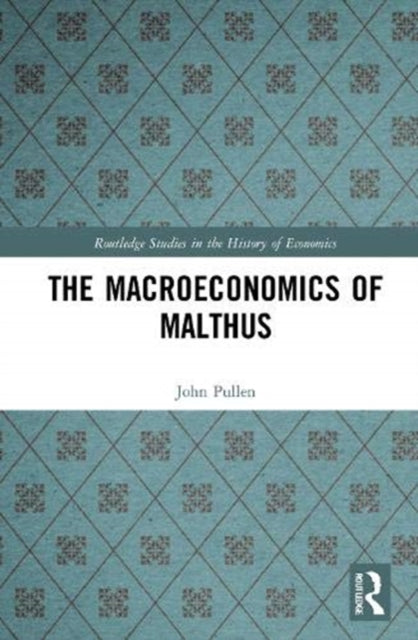John Pullen
Macroeconomics of Malthus
Macroeconomics of Malthus
YOU SAVE £6.96
- Condition: Brand new
- UK Delivery times: Usually arrives within 2 - 3 working days
- UK Shipping: Fee starts at £2.39. Subject to product weight & dimension
Bulk ordering. Want 15 or more copies? Get a personalised quote and bigger discounts. Learn more about bulk orders.
Couldn't load pickup availability
- More about Macroeconomics of Malthus
This book challenges the view that Thomas Robert Malthus' macroeconomics lacks coherence and presents textual evidence to demonstrate that it constitutes a significant system of thought with academic merit. It discusses Malthus' ideas on aggregate economic growth, general depression, mass unemployment, government intervention, income distribution, and wealth distribution. It also examines his radical ideas on land ownership and distribution and sheds new light on the influence of Malthus on Keynes.
\n Format: Hardback
\n Length: 268 pages
\n Publication date: 09 July 2021
\n Publisher: Taylor & Francis Ltd
\n
The views of Thomas Robert Malthus (1766–1834) on population, first published in his Essay on the Principle of Population, 1798, continue to be hotly debated, either acclaimed or opposed, as do his views on macroeconomics. There is a widely held view that his macroeconomics lacks coherence and is merely a collection of isolated jottings. This book challenges this view; it presents textual evidence that Malthuss macroeconomics constitutes a significant system of thought with considerable academic merit. It reawakens debate about the relative merits of Malthus and Ricardo as macroeconomists and contends that Malthus offers important macroeconomic ideas and policy proposals relevant to modern economic problems. It presents and analyses Malthus ideas on topics such as the determinants of aggregate economic growth; the causes of general depression; the remedies for mass unemployment; the balance between laissez-faire and government intervention; the optimum division of expenditure between consumption, saving, and investment; the distribution of income between wages, profits, and rents; and the degree of economic inequality. Particular emphasis is given to his view that the pattern of distribution of wealth between the upper, lower, and middle classes is a major determinant or factor in the production of wealth, and that continued economic development depends on the growth of a large and affluent middle class. The radical nature of some of his ideas and policy proposals on the ownership and distribution of land is highlighted. An extensive treatment of Says Law, incorporating aspects of the correspondence between Say and Malthus, addresses the question of whether Malthus showed that Says Law is merely a truism and lacks any scientific relevance. The book also sheds new light on the influence of Malthus on the development of economic thought and policy in the 19th century.
The views of Thomas Robert Malthus (1766–1834) on population, first published in his Essay on the Principle of Population, 1798, continue to be hotly debated, either acclaimed or opposed, as do his views on macroeconomics. There is a widely held view that his macroeconomics lacks coherence and is merely a collection of isolated jottings. This book challenges this view; it presents textual evidence that Malthuss macroeconomics constitutes a significant system of thought with considerable academic merit. It reawakens debate about the relative merits of Malthus and Ricardo as macroeconomists and contends that Malthus offers important macroeconomic ideas and policy proposals relevant to modern economic problems. It presents and analyses Malthus ideas on topics such as the determinants of aggregate economic growth; the causes of general depression; the remedies for mass unemployment; the balance between laissez-faire and government intervention; the optimum division of expenditure between consumption, saving, and investment; the distribution of income between wages, profits, and rents; and the degree of economic inequality. Particular emphasis is given to his view that the pattern of distribution of wealth between the upper, lower, and middle classes is a major determinant or factor in the production of wealth, and that continued economic development depends on the growth of a large and affluent middle class. The radical nature of some of his ideas and policy proposals on the ownership and distribution of land is highlighted. An extensive treatment of Says Law, incorporating aspects of the correspondence between Say and Malthus, addresses the question of whether Malthus showed that Says Law is merely a truism and lacks any scientific relevance. The book also sheds new light on the influence of Malthus on the development of economic thought and policy in the 19th century.
\n Weight: 564g\n
Dimension: 161 x 243 x 22 (mm)\n
ISBN-13: 9780367752255\n \n
This item can be found in:
UK and International shipping information
UK and International shipping information
UK Delivery and returns information:
- Delivery within 2 - 3 days when ordering in the UK.
- Shipping fee for UK customers from £2.39. Fully tracked shipping service available.
- Returns policy: Return within 30 days of receipt for full refund.
International deliveries:
Shulph Ink now ships to Australia, Belgium, Canada, France, Germany, Ireland, Italy, India, Luxembourg Saudi Arabia, Singapore, Spain, Netherlands, New Zealand, United Arab Emirates, United States of America.
- Delivery times: within 5 - 10 days for international orders.
- Shipping fee: charges vary for overseas orders. Only tracked services are available for most international orders. Some countries have untracked shipping options.
- Customs charges: If ordering to addresses outside the United Kingdom, you may or may not incur additional customs and duties fees during local delivery.


